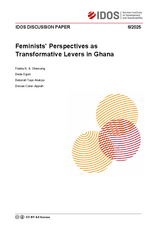Discussion Paper
Feminists’ perspectives as transformative levers in Ghana
Ohemeng, Fidelia N. A. / Deda Ogum / Deborah Tayo Akakpo / Dorcas Coker-AppiahDiscussion Paper (6/2025)
Bonn: German Institute of Development and Sustainability (IDOS)
ISBN: 978-3-96021-251-5
DOI: https://doi.org/10.23661/idp6.2025
Preis: 6 €
Ghana is a multi-party, multi-ethnic and multi-religious state, with a dominant influence of socio-cultural norms and practices that impact negatively on women in their everyday lives. Most Ghanaians are subject to customary law which discriminates against women, even though Ghana practises legal pluralism. The overall aim of the study is to explore and analyse contemporary feminist perspectives and organising in Ghana to demonstrate how they can be used as levers for transformative change for greater equality and sustainable development. This was a cross-sectional and fully qualitative study involving 35 feminists and women’s rights advocates between the ages of 37 and 80+ years, with the majority (n=25) having over 20 years of experience and relevant postgraduate degrees. Data collection, analysis and conceptualisation were guided by the gender-transformative approach and the gender at work frameworks. Our findings show that gender inequity occurs in both formal and informal spaces. Strongly held socio-cultural norms emanating from patriarchy influence women’s daily lives, and the decisions made within sub-national and national legislature. Feminist strategies span general awareness creation, through lobbying, writing and reviewing of content for policies and laws, increasing the visibility of bills to picketing to ensure the passage and implementation of applicable laws or policies. Participants consider their strategies successful despite challenges such as backlash, burnout, and the lack of funding for their activities.
Dr Fidelia N. A. Ohemeng is a senior lecturer at the Department of Sociology, University of Ghana.
Dr Deda Ogum is a senior lecturer at the Department of Population, Family & Reproductive Health, University of Ghana School of Public Health.
Deborah Tayo Akakpo is а programmes manager at the Gender Studies & Human Rights Documentation Centre, Accra Ghana.
Dorcas Coker-Appiah is the Executive Director for the Gender Studies & Human Rights Documentation Centre, Accra Ghana.
Kontakt
Cornelia Hornschild
Koordinatorin Publikationen
E-Mail Cornelia.Hornschild@idos-research.de
Telefon +49 (0)228 94927-135
Fax +49 (0)228 94927-130
Alexandra Fante
Bibliothekarin/Open Access-Koordinatorin
E-Mail Alexandra.Fante@idos-research.de
Telefon +49 (0)228 94927-321
Fax +49 (0)228 94927-130



